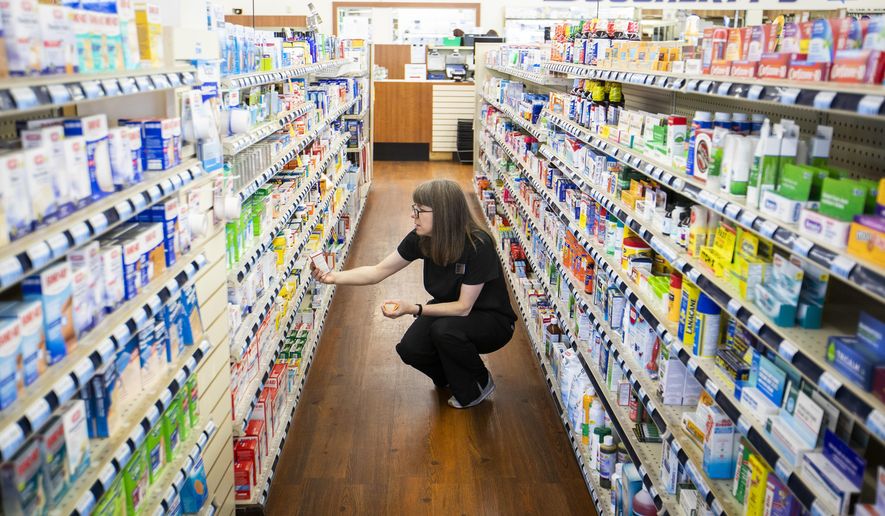The Trump administration said Tuesday that it is pushing to let consumers purchase more medicines without prescriptions, saying better labeling and digital apps that let patients “self-select” drugs would expand access to cholesterol-reducing pills, opioid overdose-reversing naloxone and other drugs.
Food and Drug Administration director Scott Gottlieb said new pathways to selling drugs over the counter also could save consumers time and money because they would no longer need to see a doctor before shopping.
“Clearly, not all prescription drugs can or should be available directly to consumers. Many require a professional diagnosis and oversight to ensure the benefits of use outweigh the risks,” he said. “But other, select types of drugs are appropriate for nonprescription use if we are able to ensure access to resources that will help patients determine if the medicine is right for them.”
Health and Human Services Secretary Alex Azar hailed the guidance as part of President Trump’s broader effort to slash drug prices and “put American patients first.”
As envisioned, the FDA would encourage drugmakers to study whether a patient could use their product reliably without a prescription or supervision of a health care professional. Then they would apply to sell their product over the counter, or OTC, through one of two pathways.
They could explore enhanced labeling that goes beyond the “drug facts” that come with nonprescription drugs so patients have a clear sense of the product’s intended use.
Drugmakers also could find ways to help consumers, likely through mobile apps, to select an appropriate product on their own. For instance, patients could click through a web-based questionnaire so they understand how the drug works and whether it is right for them.
Dr. Gottlieb said companies that use the new pathways would not be allowed to skimp on safety. The agency would still have to determine whether a patient could self-diagnose a condition and use the product as directed on their own.
“FDA is not saying any of these considerations have changed. What it is saying is that there may be innovative ways to address these considerations, for example by creating an app to help consumers determine whether a drug is right for them,” said Patricia J. Zettler, an associate professor at Georgia State University College of Law who specializes in food and drug law. “I see this as overall a positive step — an indication that FDA wants to encourage innovation in this area, so long as there are data supporting the safety and effectiveness of any new approaches to making drugs available OTC.”
The Consumer Healthcare Products Association, a trade group for makers of over-the-counter medicines, said the FDA’s guidance signaled a “long-awaited” and “welcome” update of the regulatory framework.
The most immediate effect of the change would be the relative ease of acquiring the medicines.
Analysts say costs may decline because products introduced to the market will have to be priced competitively. However, patient costs could increase in some cases if insurance will not cover an over-the-counter version of the medication.
Making drugs available over the counter also saves time for doctors, who can focus on treating other patients instead of writing prescriptions, and for consumers who can shop in store aisles instead of going to a pharmacy.
“We’re very mindful of the time and financial cost to patients and the health care system to fill a prescription medicine — particularly one taken repeatedly for chronic conditions,” Dr. Gottlieb said.
It also allows customers to shop discreetly, according to a 2016 article in the Journal of Research in Pharmacy Practice that pointed to the decision to sell the Plan B One-Step pill over the counter.
“When the emergency contraceptive went OTC, it saved women and men the need to discuss their personal lives with more people. One of the top concerns of female college students when purchasing emergency contraception was confidentiality,” the researchers wrote.
Leading concerns, however, include the inability of consumers to diagnose their conditions correctly, failure to use a medication as directed or using the drugs to treat symptoms without seeking a doctor’s help to treat an underlying condition.
The FDA said its guidance should start a conversation with the industry and broader public ahead of more detailed rule-making.
Some popular over-the-counter drugs that began as prescription-only medicines are Zyrtec and Flonase to treat allergies and Prilosec for heartburn relief.
The FDA announcement highlighted cholesterol drugs and overdose-reversing drugs — the most popular form is a nasal spray called Narcan — as examples of medications that could become more widely available under its burgeoning plan.
Some states and cities already sell Narcan without requiring a doctor’s prescription through “standing orders,” which operate as a sweeping permission for members of the public to walk into a pharmacy and purchase the drug.
• Tom Howell Jr. can be reached at thowell@washingtontimes.com.




Please read our comment policy before commenting.